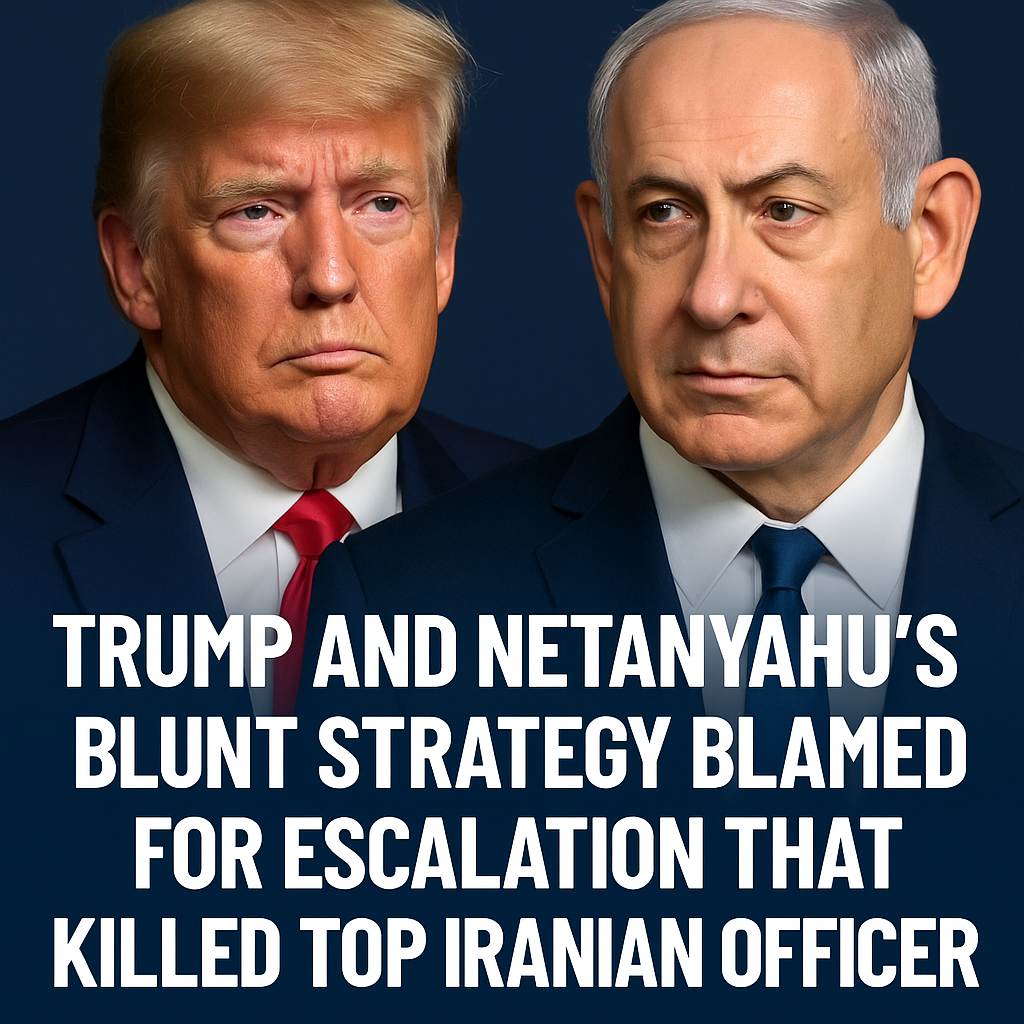FnF News
FNF News | Middle East Affairs & Global Security
Published: June 14, 2025
By: Khadija Khan, Senior Political Analyst
“Trump and Netanyahu’s Blunt Doctrine: How Plain-Text Policy Led to Escalation—and Assassination—in Iran”
Tehran / Washington D.C. / Jerusalem — In a global arena often dominated by diplomatic ambiguity and deniable operations, two leaders—Donald Trump and Benjamin Netanyahu—stand out not for subtlety, but for strategic bluntness. A growing number of analysts now argue that this bluntness may have contributed directly to one of the most consequential escalations in recent Middle East history: the targeted Israeli strike in Damascus that killed senior Iranian IRGC officials in April 2025.
The quote circulating in diplomatic circles and online forums captures the sentiment succinctly:
“In a world of diplomatic doublespeak, hypocrisy, and strategic ambiguity, Trump and Netanyahu simply said what they meant. The simple truth, plainly stated, blinded Khamenei—and his top military officers died in their own beds.”
Plain Talk, Deadly Consequences
Sources close to diplomatic and intelligence communities allege that the U.S. and Israel had coordinated for weeks before the April attack. Embassy staff and diplomatic families were quietly flown out of high-risk zones a week in advance. Satellite tracking and troop repositioning suggested heightened activity near Syrian airspace well before the strike.
Trump, who has long maintained close ties with Netanyahu and the Israeli security establishment, made several cryptic public remarks about Iran in the weeks prior, warning of “consequences for aggression” and “final warnings for terror sponsors.” Netanyahu echoed similar language, telling the Knesset that Israel “will not ask permission to defend its citizens anywhere in the world.”
But what some critics call “plain truth” others see as “premeditated provocation.” The strike, which targeted a diplomatic site in Damascus—internationally considered Iranian sovereign territory—violated multiple international norms, and yet drew no condemnation from Washington.
Iran’s Leadership Caught Off Guard
Iranian leadership, accustomed to indirect proxy conflict and public threats that rarely turn kinetic, appears to have underestimated the seriousness of the rhetoric. Supreme Leader Ayatollah Ali Khamenei’s top commanders, including senior members of the Quds Force, were reportedly sleeping in their compound when the missile struck. Forensic evidence confirmed no signs of evacuation or alert readiness, according to leaked IAEA satellite assessments.
“In Tehran’s world of shadow war, no one believed Israel would dare strike this directly,” said Dr. Shireen Taghavi, an analyst at the Carnegie Endowment. “But Trump and Netanyahu never did shadow war. They told you what was coming. Iran just didn’t believe it.”
Coordinated or Coerced?
U.S. intelligence officials have denied direct involvement in the planning of the strike but acknowledged “full situational awareness” of Israel’s intentions. According to Politico, multiple U.S. assets were moved away from Syrian and Iraqi zones two days prior.
“It was a classic ‘green light’ maneuver,” said a former Pentagon official on condition of anonymity. “Washington didn’t fire the missile, but they opened the road, turned off the traffic, and watched.”
Trump’s defenders claim this is exaggerated. “President Trump always put American lives and global peace first,” said former National Security Advisor Robert O’Brien. “But he also made it clear: There are red lines.”
Global Reaction and Legal Controversy
Iran has invoked Article 51 of the UN Charter, claiming its retaliatory missile barrage on Israeli territory was a lawful act of self-defense. The United States, UK, and EU powers have condemned Iran’s retaliation as an “escalation,” but have refused to address the legality of the original Israeli strike.
The diplomatic silence has drawn harsh criticism from legal scholars and governments in the Global South. South Africa, Pakistan, and Brazil have all labeled the Damascus strike an “act of aggression,” and expressed support for Iran’s legal position.
“This is a moment of moral clarity,” said Professor Iqbal Toure of the University of Cape Town. “If we allow targeted assassinations of officials sleeping in embassies without consequence, then the UN Charter is a dead letter.”
Conclusion: The End of Quiet War?
The era of back-channel threats and deniable drone wars may be ending. Trump and Netanyahu’s strategy, built on open threats and visible consequences, is altering the rules of engagement in real time.
Whether this boldness leads to deterrence or disaster remains to be seen. But in the words of a senior Iranian general interviewed by Al Jazeera, “We expected lies. We got the truth. That’s what killed us.”
Sources:
- UN Security Council Briefing, May–June 2025
- IAEA Satellite Reports (leaked summary via Der Spiegel)
- Politico, “White House Was Warned of Pre-Strike Evacuations” (June 2025)
- Al Jazeera Arabic interview with IRGC leadership
- Carnegie Endowment Middle East Analysis, Spring 2025
- Statements from Brazilian, South African, and Pakistani foreign ministries
- Interviews with U.S. Defense Analysts and retired officials

